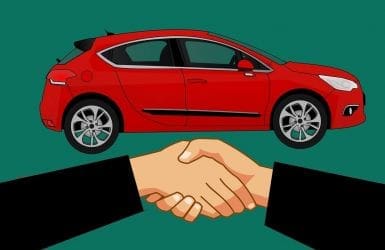
Checklist voor de aanschaf van een nieuwe auto
Van auto veranderen doet u gemiddeld maar eens in de 5 tot 7 jaar. U mag er dus best wat tijd voor uittrekken. Het beperkt zich overigens niet tot het kiezen van de beste auto tegen de voordeligste prijs. Bij de aanschaf van een splinternieuwe of tweedehands wagen zult u ook op een aantal andere zaken moeten letten. We bieden u 12 aandachtspunten, waarmee u de kans op een succesvolle aankoop aanzienlijk verhoogt.
-
Controleer de betrouwbaarheid van het autobedrijf
Het laatste wat u wilt is een auto kopen met verborgen gebreken, opgelapte schade of een teruggedraaide tellerstand. Maar hoe weet u vooraf als een autobedrijf betrouwbaar is? Allereerst kunt u afgaan op uw intuïtie door rond te kijken in het bedrijf. Bij een twijfelachtig gevoel, is het beter om meteen de uitgang op te zoeken. Maar ook als de eerste indruk prima is, de medewerkers vriendelijk zijn en uw droomauto in de showroom staat, moet u nooit dezelfde dag een koopovereenkomst tekenen. Het is aangeraden om thuis rustig wat online-onderzoek te doen naar deze autodealer. Een simpele Google search kan een schat aan informatie opleveren, zoals ratings van kwaliteitskeurmerken en ervaringen van eerdere kopers.
-
Voldoet de auto aan uw wensen
Stel vooraf goed vast wat u van uw nieuwe auto verwacht. Denk hierbij vooral aan de binnenruimte en zitplaatsen, de bagageruimte, de instaphoogte, de veiligheidsvoorzieningen en het schakelsysteem (handmatig of automatisch). Bepaal ook welk vermogen de motor moet hebben en welk brandstofverbruik u graag wilt. En uiteraard moet u van tevoren weten welk design (model, uitvoering, kleur, interieur, dashboard etc.) het beste bij uw ambitie past. Het is handig om alle wensen op een A4’tje te zetten of in uw smartphone op te slaan. Zo kunt u bij het bekijken van verschillende auto’s heel vlot een goede afweging maken.

-
Maak een proefrit in uw nieuwe auto
Nog voordat u een aankoop serieus overweegt, is het belangrijk om een uitgebreide proefrit in de auto te maken. Zorg er hierbij voor dat u niet alleen over stadswegen rijdt, maar ook over buitenwegen en een snelweg. Zo krijgt u een goede indruk van de wegligging en het rijcomfort. Om het onderstel van de auto goed te beoordelen, kunt u zelfs een weg met lichte hobbels in de route opnemen. Andere zaken waarop u mag letten zijn onder meer de instap, beenruimte, besturing, schakeling (bij handmatig schakelen) en het zicht op de weg. Heeft u een gezin? Neem die dan mee tijdens de proefrit. Auto’s reageren vaak anders met meer personen aan boord. Aarzel niet om bij hetzelfde bedrijf voor meer dan één auto een proefrit te vragen.
-
Vergelijk de auto met auto’s uit hetzelfde bouwjaar
Indien u de ideale auto hebt gevonden, wilt u natuurlijk weten als de vraagprijs realistisch is. Vergelijk deze met de vraagprijs van andere auto’s van hetzelfde model én hetzelfde bouwjaar. Dit kan bijvoorbeeld door online advertenties na te speuren. Is ‘uw’ auto duurder, dan zult u bij de verkoper moeten afdingen op de prijs. Is ‘uw’ auto stukken goedkoper, dan is de koop waarschijnlijk te mooi om waar te zijn.
-
Controleer kilometerstanden
De tellerstand zegt veel over een auto. Het geeft namelijk aan hoe intensief het voertuig is gebruikt. Een gemiddelde particulier rijdt ongeveer 15.000 km per jaar met zijn wagen. Als u een auto tegenkomt die 7 jaar oud is en maar 65.000 km heeft gereden, dan is de motor redelijk bespaard gebleven. Heeft een auto van dezelfde leeftijd al 170.000 km gereden, dan is de motor in principe bijna op. Een benzinemotor gaat doorgaans maar 200.000 tot 250.000 kilometers mee. Met de kilometerstand wordt nog weleens geknoeid door autoverkopers. Gelukkig registreert de Nationale Auto Pas (NAP) van bijna iedere auto de kilometerhistorie. Bij twijfels kunt u tegen een vergoeding van €2,99 de historie van een auto opvragen op de website van de NAP.
-
Bekijk het APK-rapport
Als u een gloednieuwe auto koopt hoeft u zich niet druk te maken om de APK (Algemene Periodieke Keuring), maar bij een occasion wel. Voor wagens met een benzinemotor is na 4 jaar een APK-rapport vereist en voor diesel- en LPG wagens al na 3 jaar. Vraag altijd naar het APK-rapport en ga na wanneer deze vervalt. Is de vervaldatum nabij, dan zult u eerstdaags een nieuwe keuring moeten laten uitvoeren. De APK keuring zelf kost maar enkele tientjes, maar tijdens de inspectie komen vaak kleine defecten naar voren (uitgedroogde banden, ongelijkmatig remmen, speling in wielophanging etc.) die verholpen zullen moeten worden. Met dit gegeven kunt u een korting op de prijs van de auto bedingen.
-
Onderhandel over de prijs
Van nature hebben autohandelaren een gedreven tot zelfs agressieve verkoopstijl. Laat u hierdoor niet intimideren. Wees ervan bewust dat uw positie als koper aanzienlijk sterker is dan die van de verkoper. U hebt namelijk de keuze uit tientallen gelijkwaardige auto’s bij andere dealers. Dit opent de mogelijkheid om te onderhandelen over de prijs van de wagen. Met wat tact kunt u ook accessoires en andere extra’s kosteloos meekrijgen. Vraag naar alle leveringsvoorwaarden, voordat u het contract tekent. Want nadat de koop gesloten is, bent u uw onderhandelingskracht volledig kwijt.
-
Koopovereenkomst
Een koopovereenkomst is een document waarop koper en verkoper kunnen terug vallen bij eventuele problemen. Laat daarom alle gegevens en afspraken opnemen in deze overeenkomst, zoals de aankoopprijs, het model en type van de auto, het motor- en chassisnummer, de kleur, de kilometerstand en de accessoires die meegeleverd worden. Ook de leveringstermijn en de garantievoorwaarden moeten helder omschreven worden. De meeste autobedrijven plaatsen in de (ver)koopovereenkomst ook algemene voorwaarden met rechten en plichten. Wanneer het bedrijf bij de brancheorganisatie BOVAG is aangesloten, zijn deze bepalingen gestandaardiseerd. Als het bedrijf geen BOVAG-lid is, is het aangeraden om de algemene voorwaarden goed door te nemen.
-
Leveringstermijn
Bij autobedrijven geldt haast altijd een leveringstermijn. Voor een gloednieuwe auto is dit vaak enkele weken en voor een tweedehands auto meestal enkele dagen. Laat de afgesproken leveringstermijn opnemen in de koopovereenkomst. Ga ook na als het autobedrijf bij de brancheorganisatie BOVAG is aangesloten. Zo kunt u de koopovereenkomst zonder gerechtelijke tussenkomst opzeggen, wanneer de verkoper de auto niet binnen de afgesproken termijn levert.
-
Garantie
Bij de aankoop van een nieuwe auto krijgt u altijd fabrieksgarantie, meestal voor 2 of 3 jaar. In de garantieperiode zorgt de vertegenwoordiger/verkoper ervoor dat gebreken aan het voertuig hersteld worden. Voor een tweedehands auto is garantie niet vanzelfsprekend, ook niet wanneer u in zee gaat met een autobedrijf. Het is goed om te vragen naar garantietermijnen voor specifieke gebreken, zoals schade aan de motor, schade aan de versnellingsbak en schade aan de airconditioning. Zie erop toe dat de termijnen gedetailleerd worden opgenomen in de koopovereenkomst. Binnen een garantieperiode hoeft u namelijk niets te bewijzen.
-
Wegenbelasting
Als u een auto bezit, betaalt u maandelijks wegenbelasting oftewel motorrijtuigenbelasting. Zodra u een nieuwe auto koopt moet u dit aangeven bij de belastingdienst. Gelukkig kan dit tegenwoordig heel eenvoudig online. De hoogte van de wegenbelasting is afhankelijk van het gewicht van de auto, het type brandstof (benzine, diesel of LPG), de milieuvervuiling van het voertuig en de provincie waarin u woont. Online kunt u de premie makkelijk vooraf berekenen. Zo kunt u bijvoorbeeld besluiten om een net iets kleinere auto (lager gewicht) te kopen om op jaarbasis een aantal tientjes te besparen op de wegenbelasting.
-
Autoverzekering afsluiten
Om met u nieuwe auto de weg op te gaan heeft u een autoverzekering nodig. In Nederland moet u minimaal een WA-verzekering afsluiten. Dit dekt eventuele schade die u bij anderen veroorzaakt. Met een volledig Casco of Allrisk verzekering wordt ook uw eigen schade door de verzekeraar vergoedt. Voor een tweedehands auto ouder dan 5 jaar is zo een optimale dekking meestal niet meer rendabel, omdat de jaarlijkse premie best hoog is.
Gebaseerd op 3699 reviews
Nooit onderverzekerd
Stel zelf je pakket samen
Een breed aanbod
Wij vergelijken alle verzekeraars voor jou, scheelt weer tijd
Hulp van onze experts
Kom je er niet uit? Onze experts staan altijd klaar om je te helpen
We zijn bereikbaar via chat, WhatsApp, telefoon of e-mail
Vragen? Neem contact met ons op als je meer wilt weten.
Wij zijn er van maandag tot vrijdag van 08:00 tot 18:00.




